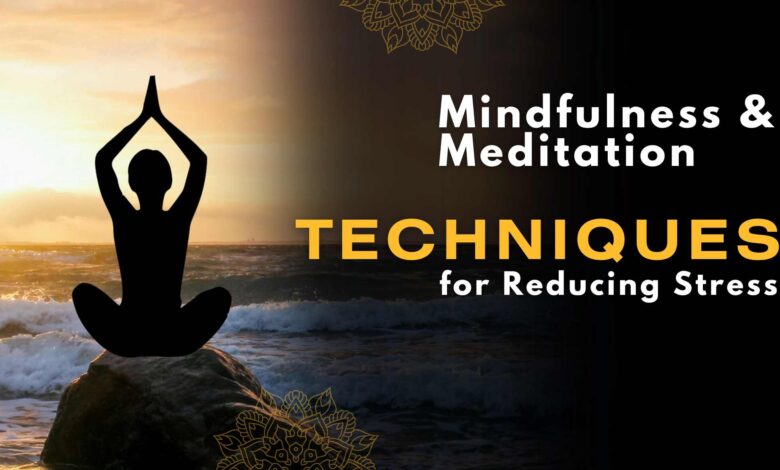

Mindfulness and Meditation: In the fast paced world, stress has become a bad thing. We are faced with work deadlines, family expenses, financial pressures, and a constant stream of messages that can make us feel overwhelmed and exhausted. This chronic stress affects our physical and mental health, causing anxiety, depression, sleep problems, and a weakened immune system.
Fortunately, there are some powerful tools you can use to beat stress and cultivate inner peace: mindfulness and meditation. These techniques, which have origins in ancient Eastern traditions, have been widely praised in the West for their effectiveness in improving well-being and reducing stress. This article explores the concepts of mindfulness and meditation, providing practical tips for implementing them in your daily life and reaping the stress-reducing benefits.
Table of Contents
Understanding memory: Cultivating contemporary understanding
Wisdom is not a state of indifference, but the state of thinking, without judgment. Focusing on the present moment and being aware of our thoughts, feelings and emotions without getting caught up in them. Imagine yourself watching your thoughts like the clouds moving through the sky—they are there, but you are not.
Benefits of Mental Reduction:
Research shows that mindfulness practice can reduce stress by:
Greater self-awareness: By becoming more aware of our thoughts and feelings, we can identify the triggers of stress and develop coping mechanisms.
Perspective Shift: Mindfulness can free us from negative thoughts, develop a more objective perspective, and reduce emotional reactions.
Improve Emotion Regulation: By examining our emotions without judgment, we can learn to manage them better.
Improve focus: Mindfulness training can improve our ability to focus on the present and reduce stress and anxiety about the future or the past.
Increases relaxation: By focusing on breathing and body sensations, mindfulness practice can relax, calm the nervous system, and reduce stress hormones.
Simple tips to grow ideas:
Mindfulness: This is the foundation of memory. Find a quiet place, sit still and focus on your breathing. Notice how the breath goes in and out of your nostrils. If your mind wanders, gently bring your attention back to your breath. Start with short intervals (2-5 minutes) and increase the duration as you feel better.
Remember to eat: But don’t eat recklessly, take it slow and enjoy every bite. Pay attention to the taste, texture and smell of your food. Be thankful for the process of feeding your body.
Body scan: Lie down or sit comfortably and focus on different parts of your body. Pay attention to feelings, such as tension, tightness, or warmth. Breathe in this feeling and look at it without judgment.
Mindful Walking: When walking, pay attention to the physical sensations of your body movement. Pay attention to the way your feet are on the ground, the movement of your hands, and the rhythm of your breathing. Observe your surroundings—the sights, sounds, and atmosphere—without judgment.
Meditation: Deepen your memory
Mindfulness meditation trains the mind to focus and achieve inner peace. There are many meditation techniques, some of which involve focusing on a specific object (breath, mantra), while others involve exploring thoughts and feelings without judgment.
Benefits of meditation to reduce stress:
The benefits of meditation to reduce stress are similar to those of mindfulness, with additional benefits:
Better concentration and focus: Practicing meditation can improve your ability to focus on the tasks at hand, increase productivity, and reduce stress when multitasking.
Increase self-compassion: Meditation promotes a sense of acceptance and self-compassion, reduces self-doubt, and improves emotional well-being.
Improves the quality of sleep: By calming the mind and reducing stress hormones, meditation leads to deeper, more restful sleep, which in turn promotes stress reduction.
Also Read: Fitness at Home: Effective Workouts Without the Gym
Meditation Tips for Beginners:
Focused Meditation: Choose an anchor, such as a breath or a mantra (a repeated word or phrase). Whenever your mind wanders, focus on the anchor point.
Mantra Meditation: Chant mantra while meditating. A mantra can be a calming word like “peace” or a word like “Om Shanti” (Sanskrit for “inner peace”). Focus on the sound and vibration of the mantra.
Compassionate Mindfulness: Develop thoughts of kindness and compassion toward yourself and others. Think of someone you care about and send your blessings to them silently.
Remember: There is no “right” way to meditate. The key is to find a routine that works for you and do it regularly. Start with short meditation sessions (5-10 minutes) and gradually increase the length as you feel better.




